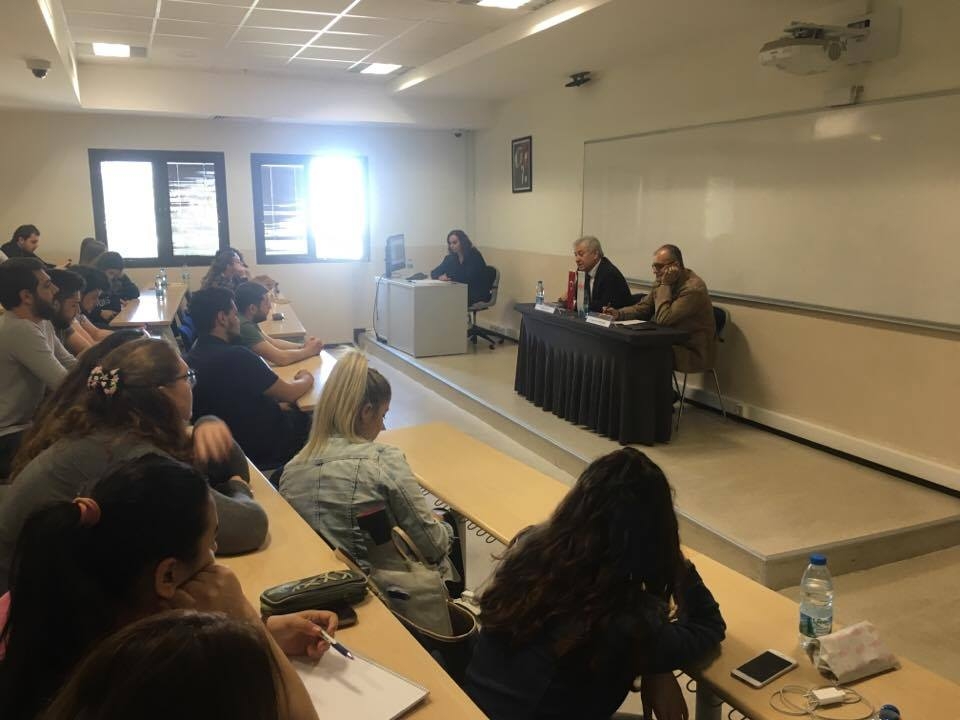
...
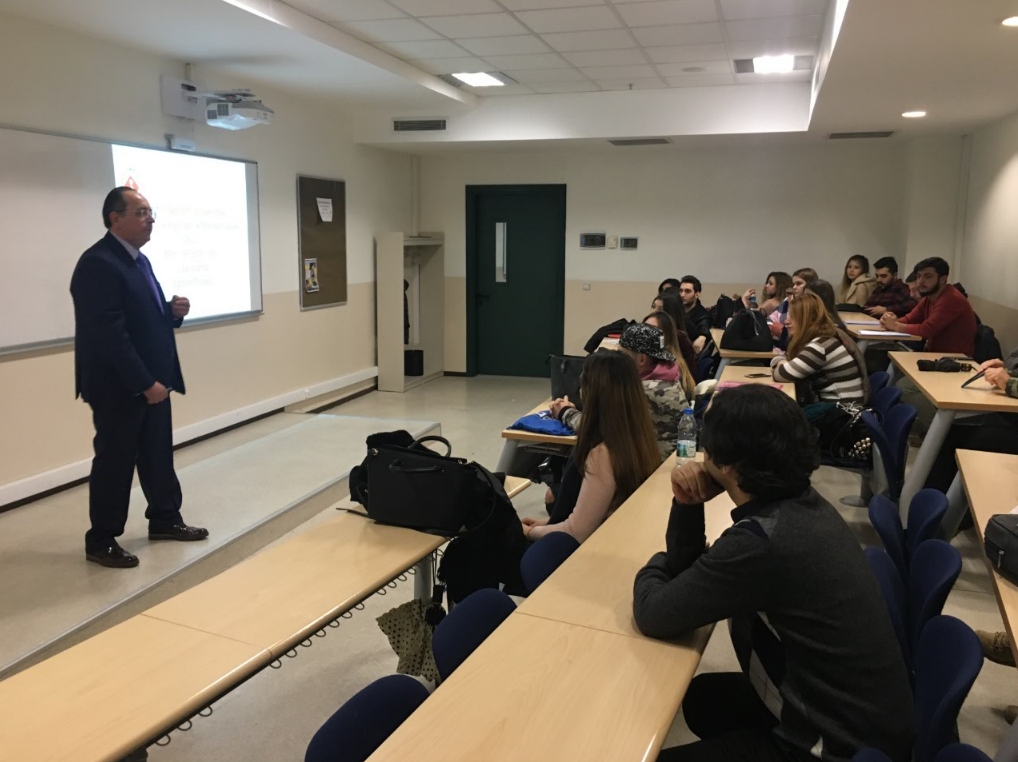
...
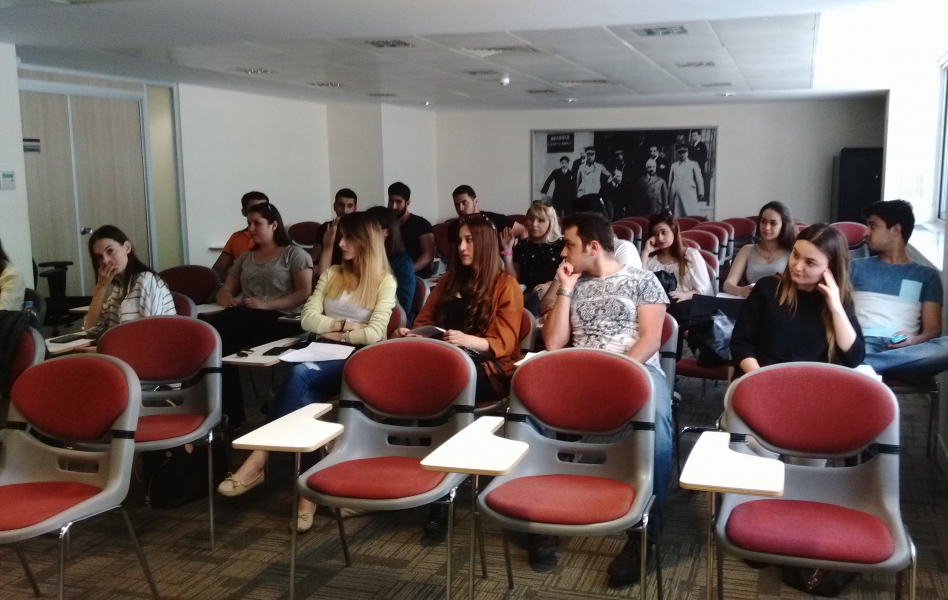
...
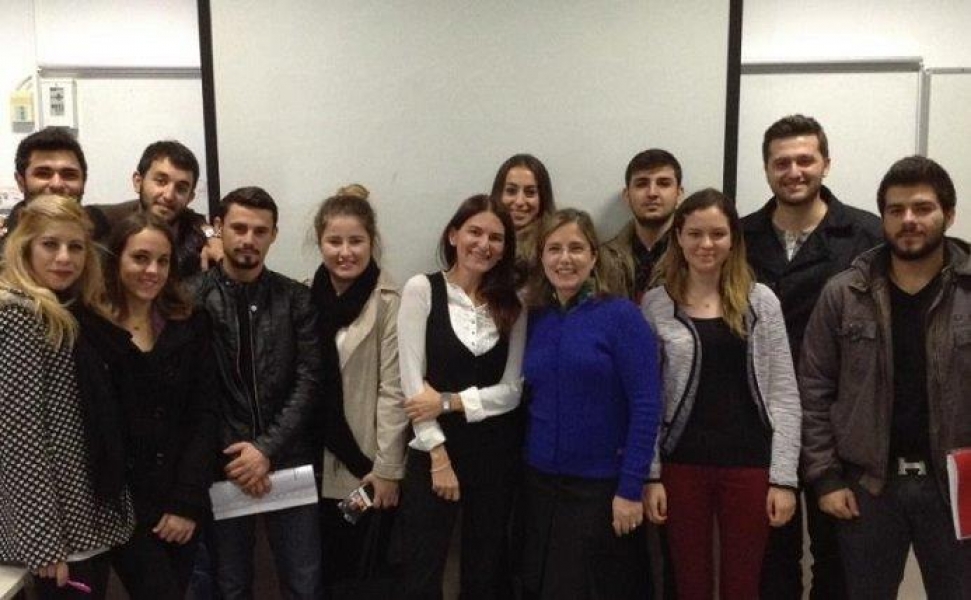
...
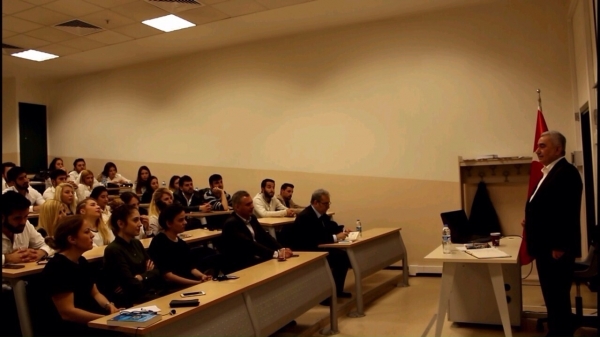
...

...
| Course Name |
Turkish II
|
|
Code
|
Semester
|
Theory
(hour/week) |
Application/Lab
(hour/week) |
Local Credits
|
ECTS
|
|
TRK 102
|
Fall/Spring
|
2
|
0
|
2
|
1
|
| Prerequisites |
None
|
|||||
| Course Language |
Turkish
|
|||||
| Course Type |
Service Course
|
|||||
| Course Level |
First Cycle
|
|||||
| Mode of Delivery | - | |||||
| Teaching Methods and Techniques of the Course | DiscussionQ&ALecture / Presentation | |||||
| National Occupation Classification | - | |||||
| Course Coordinator | ||||||
| Course Lecturer(s) | ||||||
| Assistant(s) | - | |||||
| Course Objectives | The course aims toshow the characteristics and rules of the Turkish language with examples help students develop familiarity and skills for expressing their feelings, thoughts, plans, impressions, observations and experiences through written and spoken language correctly and effectivelyexpand vocabulary through written and spoken texts develop reading and listening comprehension develop overall language skills, which are essential to interpersonal communication |
| Learning Outcomes |
The students who succeeded in this course;
|
| Course Description | Students will be taught how to use the written communication tools accurately and efficiently in this course. There will be exercises on understanding, telling, reading, and writing; types of speeches (panel, symposium, conference, etc.) will be introduced; the student will be equipped with information on using body language, accent and intonation, and presentation techniques. |
| Related Sustainable Development Goals |
|
|
|
Core Courses | |
| Major Area Courses | ||
| Supportive Courses | ||
| Media and Management Skills Courses | ||
| Transferable Skill Courses |
| Week | Subjects | Related Preparation |
| 1 | Formation of Speech and Speech | Yakıcı, A., Yücel, M., (...);Yelok,S. (2015). Sözlü Anlatım, Üniversiteler için Türkçe 2, Yargı Publishing House, Ankara, p. 1-10 |
| 2 | Writing Principles Concerning Our Speaking Language, Correct Writing | Yakıcı, A., Yücel, M., (...);Yelok,S. (2015). Sözlü Anlatım, Üniversiteler için Türkçe 2, Yargı Publishing House, Ankara, p. 13 |
| 3 | Correct Pronunciation- Diction and Its Importance, Rules to be Followed for a Successful Diction | Yakıcı, A., Yücel, M., (...);Yelok,S. (2015). Sözlü Anlatım, Üniversiteler için Türkçe 2, Yargı Publishing House, Ankara, p. 10-12 |
| 4 | Proper Emphasis, Types of Emphasis | Yakıcı, A., Yücel, M., (...);Yelok,S. (2015). Sözlü Anlatım, Üniversiteler için Türkçe 2, Yargı Publishing House, Ankara, p. 15-20 |
| 5 | Proper intonation, Practices for Increasing Sound Values | Yakıcı, A., Yücel, M., (...);Yelok,S. (2015). Sözlü Anlatım, Üniversiteler için Türkçe 2, Yargı Publishing House, Ankara, p. 21-24 |
| 6 | Speech Disorders And Treatment: 1. Speech Disorders Related To Personality And Behaviour Disorders 2. Speech Mistakes Related To Pronunciation 3. Speech Mistakes Related To Not Knowing | Yakıcı, A., Yücel, M., (...);Yelok,S. (2015). Sözlü Anlatım, Üniversiteler için Türkçe 2, Yargı Publishing House, Ankara, p. 24-31 |
| 7 | NECESSARY COMPONENTS FOR A SUCCESSFUL SPEECH: To Use Body Language | Yakıcı, A., Yücel, M., (...);Yelok,S. (2015). Sözlü Anlatım, Üniversiteler için Türkçe 2, Yargı Publishing House, Ankara, p. 32-36 |
| 8 | Effective Listening | Yakıcı, A., Yücel, M., (...);Yelok,S. (2015). Sözlü Anlatım, Üniversiteler için Türkçe 2, Yargı Publishing House, Ankara, p. 53-71 |
| 9 | PREPARING A PLANNED SPEECH: Structuring a Speech Text: Identifying a Goal, Getting to Know the Audience, Establishing a Thought Zone, Making Connections, Collecting Data, Research, Sample Presentations about the Subject | Yakıcı, A., Yücel, M., (...);Yelok,S. (2015). Sözlü Anlatım, Üniversiteler için Türkçe 2, Yargı Publishing House, Ankara, p. 42-46 |
| 10 | Discussion: open session, panel, symposium | Yakıcı, A., Yücel, M., (...);Yelok,S. (2015). Sözlü Anlatım, Üniversiteler için Türkçe 2, Yargı Publishing House, Ankara, p. 119-157 |
| 11 | Discussion: forum, debate, colloquium | Yakıcı, A., Yücel, M., (...);Yelok,S. (2015). Sözlü Anlatım, Üniversiteler için Türkçe 2, Yargı Publishing House, Ankara, p. 158-190 |
| 12 | Types of Oral Expression: conference, speech, congress | Yakıcı, A., Yücel, M., (...);Yelok,S. (2015). Sözlü Anlatım, Üniversiteler için Türkçe 2, Yargı Publishing House, Ankara, p. 195-211 |
| 13 | Communication and Comprehension: Expression, Meaning, Comprehension | Yakıcı, A., Yücel, M., (...);Yelok,S. (2015). Sözlü Anlatım, Üniversiteler için Türkçe 2, Yargı Publishing House, Ankara, p. 211-227 |
| 14 | Vocal Errors: Accent Errors, Pronunciation Errors, Pausing Error, Dissonance | Yakıcı, A., Yücel, M., (...);Yelok,S. (2015). Sözlü Anlatım, Üniversiteler için Türkçe 2, Yargı Publishing House, Ankara, p. 305-331 |
| 15 | General review | Video and course presentations |
| 16 | Review of the Semester |
| Course Notes/Textbooks | Yakıcı, A., Yücel, M., (...); Yelok, S. (2015). Türkçe 2, Üniversiteler için Sözlü Anlatım. Yargı Publishing House, Ankara. |
| Suggested Readings/Materials | Önen, A. (2007). Türkçeyi Türkçe Konuşmak, İnkılap Yayınevi, İstanbul.
|
| Semester Activities | Number | Weigthing |
| Participation | ||
| Laboratory / Application | ||
| Field Work | ||
| Quizzes / Studio Critiques |
2
|
30
|
| Portfolio | ||
| Homework / Assignments | ||
| Presentation / Jury | ||
| Project | ||
| Seminar / Workshop | ||
| Oral Exams | ||
| Midterm |
1
|
30
|
| Final Exam |
1
|
40
|
| Total |
| Weighting of Semester Activities on the Final Grade |
2
|
55
|
| Weighting of End-of-Semester Activities on the Final Grade |
1
|
45
|
| Total |
| Semester Activities | Number | Duration (Hours) | Workload |
|---|---|---|---|
| Theoretical Course Hours (Including exam week: 16 x total hours) |
16
|
2
|
32
|
| Laboratory / Application Hours (Including exam week: '.16.' x total hours) |
16
|
0
|
|
| Study Hours Out of Class |
10
|
1
|
10
|
| Field Work |
0
|
||
| Quizzes / Studio Critiques |
2
|
2
|
4
|
| Portfolio |
0
|
||
| Homework / Assignments |
0
|
||
| Presentation / Jury |
0
|
||
| Project |
0
|
||
| Seminar / Workshop |
0
|
||
| Oral Exam |
0
|
||
| Midterms |
1
|
6
|
6
|
| Final Exam |
1
|
10
|
10
|
| Total |
62
|
|
#
|
Program Competencies/Outcomes |
* Contribution Level
|
|||||
|
1
|
2
|
3
|
4
|
5
|
|||
| 1 |
To be able to develop themselves in the subjects of obtaining the financial resources necessary for the activities of individuals and enterprises under the most favorable conditions and examining the use of the accumulated funds. |
-
|
-
|
-
|
-
|
-
|
|
| 2 |
To be able to discuss the role, importance and functions of the institutions providing banking and insurance services in the economic system |
-
|
-
|
-
|
-
|
-
|
|
| 3 |
To be able to evaluate the organizational structure, business processes, and service portfolios of banks, insurance companies, and other financial institutions operating in the sector. |
-
|
-
|
-
|
-
|
-
|
|
| 4 |
To be able to develop skills in identifying, measuring, and assessing financial and operational risks, and to acquire fundamental knowledge to understand and apply insurance products against these risks. |
-
|
-
|
-
|
-
|
-
|
|
| 5 |
To be able to recognize financial products offered in the banking and insurance sector, and to gain skills in effective marketing and sales, as well as managing long-term customer relationships. |
-
|
-
|
-
|
-
|
-
|
|
| 6 |
To be able to possess basic legal knowledge and closely monitor legislative changes relevant to the field. |
-
|
-
|
-
|
-
|
-
|
|
| 7 |
To be able to possess basic knowledge of accounting and analyze financial statements to evaluate the financial status of businesses. |
-
|
-
|
-
|
-
|
-
|
|
| 8 |
To be able to follow technological innovations in the financial sector and acquire knowledge about the role of blockchain and artificial intelligence applications in the industry. |
-
|
-
|
-
|
-
|
-
|
|
| 9 |
To be able to make decisions based on the principles of professional ethics, accountability and responsibility |
-
|
-
|
-
|
-
|
-
|
|
| 10 |
To be able to follow international financial markets and global economic indicators by using English at least at the A2 level of the "European Language Portfolio" |
-
|
-
|
-
|
-
|
-
|
|
| 11 |
To be able to analyze and interpret banking and insurance data, and to develop data-driven strategies for financial decision-making. |
-
|
-
|
-
|
-
|
-
|
|
| 12 |
To be able to acquire knowledge about the components of national and international systems and the implementation of sector policies. |
-
|
-
|
-
|
-
|
-
|
|
| 13 |
To be able to direct his/her education to a further level of education |
-
|
-
|
-
|
-
|
-
|
|
*1 Lowest, 2 Low, 3 Average, 4 High, 5 Highest

...

...

...

...

...

...

As Izmir University of Economics transforms into a world-class university, it also raises successful young people with global competence.
More..Izmir University of Economics produces qualified knowledge and competent technologies.
More..Izmir University of Economics sees producing social benefit as its reason for existence.
More..